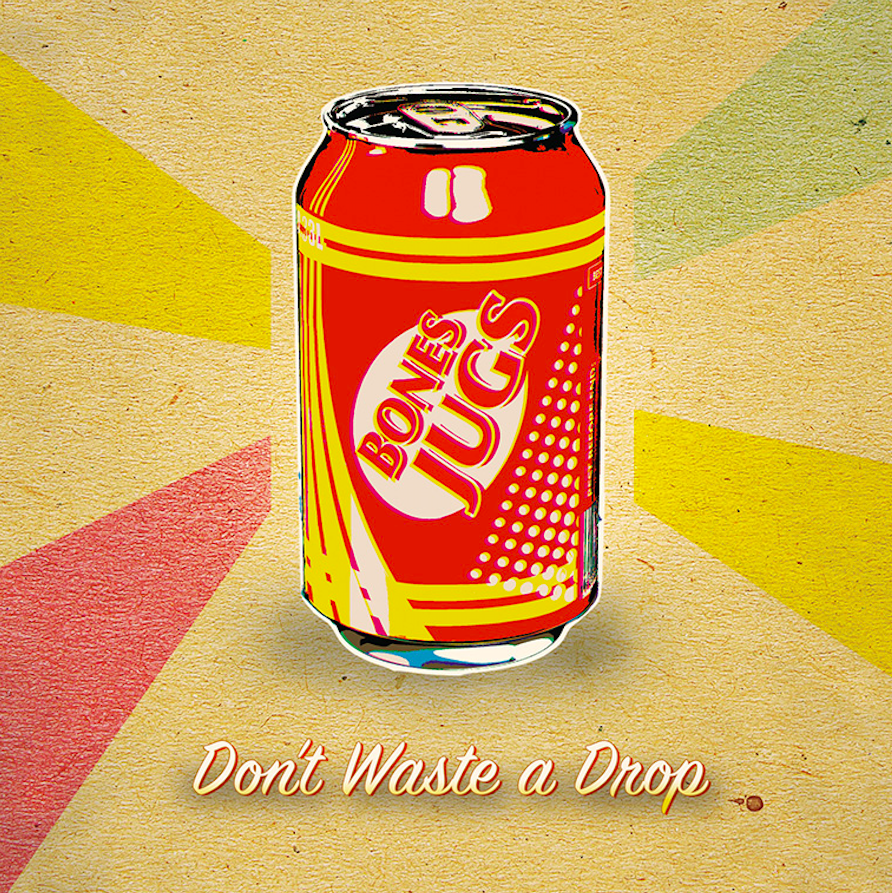I have to admit, I was skeptical when I first put on the new album by Bones Jugs. The Urbana band may know how to put on a show, but would their “new-agey jugband ragtime” really work in album form? A number of things had me concerned: their kazoos, the lack of commas in the band’s name, their copious facial hair… What can I say? I’m a worrywart. Plus, I’m not really someone who knows how to “shake his rump” or to enjoy music that’s “fun”.
It is true that Bones Jugs are a live band first and foremost. Their shows have been known to turn into celebrations, hoedowns, even hootenannies. Their lively performances and constant touring have earned them a dedicated fanbase (who may or may not be known as Bones Juggalos) in the C-U area and beyond. Their love of busking and street music shines through in their dedication to charming and delighting listeners.
“Love Don’t Pay the Bills” starts the album on a strong note (a middle C played on kazoos, to be precise). But it was the second song, “Black Dog,” that really got me on the album’s wavelength. Listening to it, I was able to start to piece together the three elements that drive Bones Jugs.
First off, the four-piece is made up of very skilled musicians. Precise, staccato xylophone is a highlight throughout. “Black Dog” also uses percussive musical bones, along with jug and banjo to complement a solid backing of ragtime piano. The jawbone and kazoo solo sounds ramshackle and precise at the same time. Everything about the band that sounds thrown together takes considerably more chops to play than I had initially realized. Just the sheer number of instruments on display is impressive.
Second, even though Bones Jugs have the skill set to play as a straight ragtime band, or a straight Appalachian string band, or a country jug band, they aren’t interested in just capturing a single style of music. This isn’t a Portlandia sketch, and they aren’t trying to slavishly recreate the 1890s, or any one period. Bones Jugs plays a mix-and-match assembly of genres, running the gamut of Americana from ragtime and blues to country and bluegrass. Most delightfully, they often merge those genres in unexpected ways, which puts a modern spin on their throwback elements.
And finally, as much as the band is devoted to diverse and surprising sounds, more than anything they’re devoted to silliness. “Black Dog” is a paean to the beloved local smokehouse, from its burnt ends to its sauces to its sometimes-punishing wait for seating. And it begins with a maudlin piano intro, all part of Bones Jugs’ charmingly silly streak.
All of these aspects are in full swing on instrumental “Kimmy Nibbler”. The xylophone stylings get serious, along with a fiddle solo and Spike Jones-esque honks and percussion. “The Nurse Is In” adds a dash of R&B horns to the steel drum and xylophone, delivering the closest the album comes to a rocking single.
Bones Jugs may have dropped the “N Harmony” from their name since their first album, 2014’s Party’s in the Kitchen, but rest assured that the vocals aren’t lacking on their new effort. There’s a nice plaintive pairing of the vocals and fiddle on “I Know That You Get Told This All the Time”. Enthusiastic backing harmonies come in on upbeat songs like “Pan Fried” and “Dang”. The lyrics may not sweep you away with their poetry, mostly falling somewhere between serviceable and clever, but the melodies are sweet enough that it’s not an issue. Don’t Waste A Drop has a sharper, more direct sound than Bones Jugs first album. There’s less kazoo and more trumpet, and the recording is clear and warm, all part of an ever-so-slight maturation. The vibe is less loose, not as energetic or sloppy. There’s certainly nothing as Bonnaroo-ready as the first album’s “XXXs” or as immediately dance-oriented as “Wiggle Ya Bones”.
Still, more than anything Bones Jugs do want you to dance. One of the biggest challenges on this album is keeping the party vibe going for the entire 50 minute running time. Sometimes the band has to slow the rhythm a couple notches or change the tone, opting for a gentler swing on “Coffee Song”, or employing a pentatonic stomp for “Side Door Blues”. With its ragged backing vocals and tight guitar and harmonica solo, that latter comes closest to what Oh Brother, Where Art Thou called “good old-timey music”.
Trying out different, slightly darker sounds does pay dividends for Bones Jugs. It leads to my favorite track on the album: “Ain’t No Monday” starts as a slow, dark blues, then eventually mutates into a boozy, strangely stately number. It’s jazzy and a bit dirge-like, and features one of the album’s strongest, most sing-along-able choruses. Its climax transitions nicely into a cheerful encore, a cover of The Jungle Book’s “The Bare Necessities” that brings the album to a breezy close.
So even though I was skeptical at first, Bones Jugs won me over with their combination of good cheer and serious xylophone chops. In my estimation, if you do put on Don’t Waste a Drop at your next party, then it won’t be long before cats are dancing with dogs, muttonchops start growing from the faces of men, women and babies alike, and a serious hoeing-down commences. If it worked for someone as fun-allergic as me, then it seems like Bones Jugs should be able to charm anyone.
Bones Jugs will release Don’t Waste A Drop at the Accord this Saturday, April 30th, 8 p.m, along with Fiona Kimble and Samuel Payne. Tickets are $8 in advance and $10 at the door.
About Nathaniel:
Nathaniel Forsythe is a writer living in Champaign. He may be allergic to fun, but thanks to the magic of Flonase he can still have a jolly old time.








